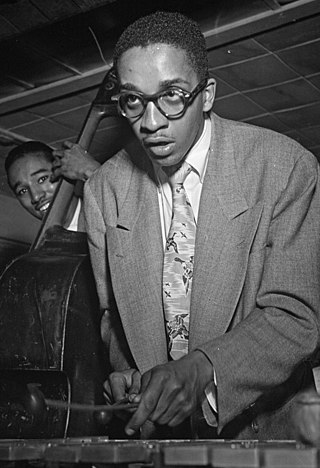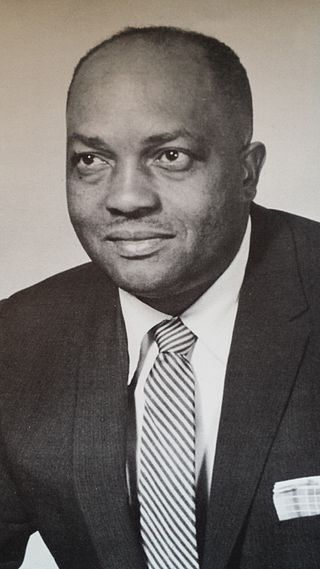Related Research Articles

Edward Kennedy "Duke" Ellington was an American jazz pianist, composer, and leader of his eponymous jazz orchestra from 1923 through the rest of his life.

A big band or jazz orchestra is a type of musical ensemble of jazz music that usually consists of ten or more musicians with four sections: saxophones, trumpets, trombones, and a rhythm section. Big bands originated during the early 1910s and dominated jazz in the early 1940s when swing was most popular. The term "big band" is also used to describe a genre of music, although this was not the only style of music played by big bands.

William James "Count" Basie was an American jazz pianist, organist, bandleader, and composer. In 1935, he formed the Count Basie Orchestra, and in 1936 took them to Chicago for a long engagement and their first recording. He led the group for almost 50 years, creating innovations like the use of two "split" tenor saxophones, emphasizing the rhythm section, riffing with a big band, using arrangers to broaden their sound, his minimalist piano style, and others.

Joe Williams was an American jazz singer. He sang with big bands, such as the Count Basie Orchestra and the Lionel Hampton Orchestra, and with small combos. He sang in two films with the Basie orchestra and sometimes worked as an actor.

Milton Jackson, nicknamed "Bags", was an American jazz vibraphonist. He is especially remembered for his cool swinging solos as a member of the Modern Jazz Quartet and his penchant for collaborating with hard bop and post-bop players.

Clark Virgil Terry Jr. was an American swing and bebop trumpeter, a pioneer of the flugelhorn in jazz, and a composer and educator.
The swing era was the period (1933–1947) when big band swing music was the most popular music in the United States, especially for teenagers. Though this was its most popular period, the music had actually been around since the late 1920s and early 1930s, being played by black bands led by such artists as Duke Ellington, Jimmie Lunceford, Bennie Moten, Cab Calloway, Earl Hines, and Fletcher Henderson, and white bands from the 1920s led by the likes of Jean Goldkette, Russ Morgan and Isham Jones. An early milestone in the era was from "the King of Swing" Benny Goodman's performance at the Palomar Ballroom in Los Angeles on August 21, 1935, bringing the music to the rest of the country. The 1930s also became the era of other great soloists: the tenor saxophonists Coleman Hawkins, Ben Webster and Lester Young; the alto saxophonists Benny Carter and Johnny Hodges; the drummers Chick Webb, Gene Krupa, Jo Jones and Sid Catlett; the pianists Fats Waller and Teddy Wilson; the trumpeters Louis Armstrong, Roy Eldridge, Bunny Berigan, and Rex Stewart.

The Count Basie Orchestra is a 16- to 18-piece big band, one of the most prominent jazz performing groups of the swing era, founded by Count Basie in 1935 and recording regularly from 1936. Despite a brief disbandment at the beginning of the 1950s, the band survived long past the big band era itself and the death of Basie in 1984. It continues under the direction of trumpeter Scotty Barnhart.
Walter Sylvester Page was an American jazz multi-instrumentalist and bandleader, best known for his groundbreaking work as a double bass player with Walter Page's Blue Devils and the Count Basie Orchestra.

Michael Corbett Shannon is an American actor. Shannon received two Academy Award for Best Supporting Actor nominations, for Revolutionary Road (2008), and Nocturnal Animals (2016). He received Screen Actors Guild Award and Golden Globe Award nominations for his role in 99 Homes (2014).
Orchestral jazz or symphonic jazz is a form of jazz that developed in New York City in the 1920s. Early innovators of the genre, such as Fletcher Henderson and Duke Ellington, include some of the most highly regarded musicians, composers, and arrangers in all of jazz history. The fusion of jazz's rhythmic and instrumental characteristics with the scale and structure of an orchestra, made orchestral jazz distinct from the musical genres that preceded its emergence. Its development contributed both to the popularization of jazz, as well as the critical legitimization of jazz as an art form.

Tarell Alvin McCraney is an American playwright. He is the chair of playwriting at the Yale School of Drama and a member of the Steppenwolf Theatre Ensemble.
George Edward "Butch" Ballard was an American jazz drummer who played with Louis Armstrong, Count Basie, and Duke Ellington.
Henderson Chambers was an American jazz trombonist.
Harold "Money" Johnson was an American jazz trumpeter.

The Regal Theater was a night club, theater, and music venue, popular among African Americans, located in the Bronzeville neighborhood in Chicago, Illinois. The theater was designed by Edward Eichenbaum, and opened in February 1928. It closed in 1968 and was demolished in 1973.
Graham Washington Jackson Sr. was an American theatre organist, pianist, accordionist, and choral conductor. He was the subject of a Life magazine photograph taken at the departure of Franklin D. Roosevelt's funeral train.

James A. Dallas Sr. was an American educator, entrepreneur, musical patron and civic leader from Fort Lauderdale, Florida. He was the first African-American man to have a street in downtown Fort Lauderdale named in his honor.

Zelia N. Breaux was an American music instructor and musician who played the trumpet, violin and piano. She organized the first music department at Langston University in Oklahoma and the school's first orchestra. As the Supervisor of Music for the segregated African American schools in Oklahoma City, Breaux organized bands, choral groups and orchestras, establishing a music teacher in each school in the district. She had a wide influence on many musicians including Charlie Christian and Jimmy Rushing, as well as novelist Ralph Ellison. Breaux was the first woman president of the Oklahoma Association of Negro Teachers and was posthumously inducted into the Oklahoma YWCA Hall of Fame, Oklahoma Women's Hall of Fame and the Oklahoma Bandmasters Association Hall of Fame. The Oklahoma City/County Historical Society made a posthumous presentation of its Pathmaker Award to Breaux in 2017.
Melton "Shakir" Mustafa Sr. (November 23, 1947 – December 28, 2017) was an American jazz musician, music educator, and arranger who played the trumpet and flugelhorn.
References
- 1 2 Jensen, Trevor (15 September 2006). "John M. Watson Sr.: 1937 - 2006". Chicago Tribune . Retrieved 26 February 2011.
- ↑ "Groundhog Day: Where are they now?". New York Daily News. Retrieved 26 February 2011.